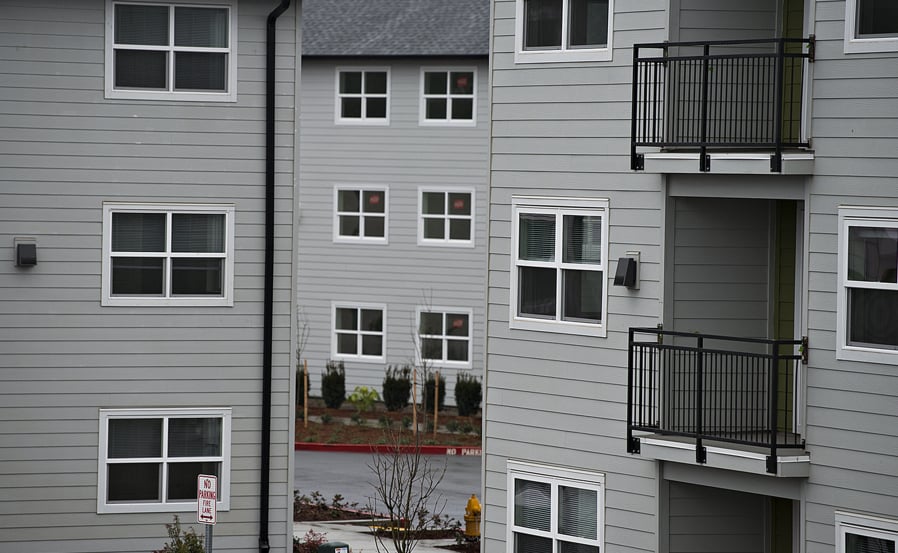The 192-unit K West Apartments in central Vancouver is beginning to lease up. It’s the largest income-restricted project built in response to Clark County’s lack of affordable housing.
K West is restricted to households earning 60 percent of the area median income or less, which works out to $48,840 for a family of four, $39,120 for a couple or $34,200 for a single person. Rents are $843 for a one-bedroom, $1,009 for a two-bedroom and $1,164 for a three-bedroom unit.
Melora Banker, project manager with DBG Properties LLC, said the complex recently got its first certificate of occupancy for one residential building and anticipates getting occupancy for the others over the next two weeks.
Portland-based DBG was behind 13 West and 15 West in downtown Vancouver, built in 2017 and 2016. DBG is unusual in that it’s a for-profit company developing income-restricted housing.
DBG used several different financing tools, including the city’s multifamily tax exemption program, to build K West. In return for keeping rents affordable, DBG will receive a tax break estimated at $149,979 in taxes over 12 years. Through the 4 percent Low Income Housing Tax Credit Program, K West received $10.6 million in equity financing, according to the Washington State Housing Finance Commission. The credits are paired with bonds; K West has both taxable and tax-exempt bonds.
Vancouver has begun seeing more for-profits interested in building affordable housing, as evident by the number of them seeking money from the Affordable Housing Fund.
Nina Preas, community manager with property manager GSL Properties LLC, said she’s getting five to 10 emails and phone calls per day about K West, a nonsmoking property that will feature a seasonal pool and community garden. About a dozen people are in the screening process, 40 are in the pre-application phase and dozens more are on a call-back list.
The complex’s opening comes as local vacancy rates appear to be rising, a good sign for prospective renters. According to Multifamily NW’s fall report, the vacancy rate was 3.7 percent in west Vancouver and 4.3 percent in east Vancouver. That’s still below what’s considered healthy in a rental market, but it’s an improvement from when vacancy rates were below 2 percent. A different survey of rental units by the Washington Center for Real Estate Research found Vancouver’s vacancy rate was 2.07 percent in the fall.
The online service Apartment List says median rents in Vancouver are $1,400 for a one-bedroom apartment and $1,650 for a two-bedroom, about a 2 percent increase from the past year.
At 5500 N.E. Fourth Plain Blvd., K West is one of several income-restricted residential projects popping up along the Fourth Plain corridor in central Vancouver.
Meriwether Place, Isabella Court, 34th Street Apartments and The Meadows already opened in the last couple of years. Construction is about halfway done on REACH Community Development’s 49-unit Isabella Court II, which is slated to be finished in August. Sea Mar Community Health Centers aims for a July opening of its six-story, mixed-use building across the street from Vancouver Plaza. It includes medical and dental offices on the ground floor and 70 apartments on the other five floors. Housing Initiatives LLC hasn’t begun construction on The Pacific (18 units) or The Elwood (46 units).
Developers of these projects have lauded Fourth Plain’s transit accessibility.




